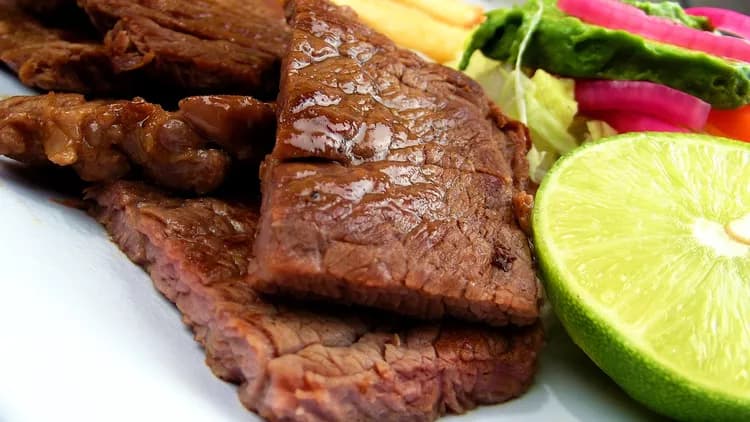Individuals around the world have increased their demand for meat. According to the U.S. Department of Agriculture, the average American ate more than 70 pounds of red meat (beef, veal, pork, and lamb) in 2012. Studies have shown that not only is it important to monitor what we eat, but it also matters what the source of the food has consumed.
Whether the cows are grass-fed or grain-fed, they start their lives out the same. The calves drink milk from their mothers and roam free in the fields eating grass, clovers, and shrubs. After approximately six to 15 months, the grain-fed cows are moved to feedlots while the grass-fed cows continue to roam.
The grain-fed cows are usually fed grains with a base of soy or corn and are quickly fattened up in the large feedlots or Concentrated Animal Feeding Operations (CAFOs). In addition, grain-fed cows are usually given drugs and hormones to grow faster, as well as antibiotics to survive unsanitary living conditions.
Do these living conditions affect the composition of the cow?
A cow’s diet has a major effect on the nutrient selection of the beef. Grass-fed beef and grain-fed beef contain many nutrients, like vitamins B12, B3, and B6. They are also rich in bio-available iron, zinc, and selenium. Both also include high-quality protein as well as creatine and carnosine. Creatine helps humans supply energy to all cells in the body, mainly skeletal muscle. Carnosine has several antioxidant properties that fight off chemicals that damage the body. They can be found primarily in the brain and muscle tissue. However, grass-fed beef and grain-fed beef have nutritional differences.
Grass-fed beef has fewer calories than grain-fed beef because it has less total fat. Grass-fed beef may contain slightly less total saturated fat and monounsaturated fat than grain-fed beef, but grass-fed beef will contain much more omega-3 fatty acids and conjugated linoleic acid (CLA). In fact, researchers from the Union of Concerned Scientists found that grass-fed steak has about twice as many omega-3 fatty acids as a standard grain-fed steak. Omega-3 fatty acids can help protect the heart and fight off diseases. Grass-fed beef contains approximately twice as much CLA as grain-fed beef. According to the American Journal of Clinical Nutrition, CLA is associated with reduced body fat and some other beneficial effects.
Overall, the macronutrient content may be similar. However, the micronutrient content (omega 3 fatty acids, for example), the antibiotic content, and other toxic chemical content may be much better in grass-fed beef compared to non-grass-fed beef.
Additional Resources:
Bentley, J. (2014, December 4). Food Availability (Per Capita) Data System. Retrieved January 19, 2015, from http://www.ers.usda.gov/data-products/food-availability-(per-capita)-data-system/.aspx#.VC1x2CtdVPQ
Daley, C. A., Abbott, A., Doyle, P. S., Nader, G. A., & Larson, S. (2010). A review of fatty acid profiles and antioxidant content in grass-fed and grain-fed beef. Nutrition journal, 9(1), 10.
Leheska, J. M., Thompson, L. D., Howe, J. C., Hentges, E., Boyce, J., Brooks, J. C., ... & Miller, M. F. (2008). Effects of conventional and grass-feeding systems on the nutrient composition of beef. Journal of animal science, 86(12), 3575-3585.
Pelletier, N., Pirog, R., & Rasmussen, R. (2010). Comparative life cycle environmental impacts of three beef production strategies in the Upper Midwestern United States. Agricultural Systems, 103(6), 380-389.
Ponnampalam, E., Mann, N., & Sinclair, A. (2006). Effect of feeding systems on omega-3 fatty acids, conjugated linoleic acid and trans fatty acids in Australian beef cuts: potential impact on humnan health. Asia Pacific Journal of Clinical Nutrition, 15(1), 21-29.
Whigham, L. D., Watras, A. C., & Schoeller, D. A. (2007). Efficacy of conjugated linoleic acid for reducing fat mass: a meta-analysis in humans. The American Journal of Clinical Nutrition, 85(5), 1203-1211.
Related Articles
Test Your Knowledge
Asked by users
Related Centers
Related Specialties
Related Physicians
Related Procedures
Related Resources
Join DoveHubs
and connect with fellow professionals


0 Comments
Please log in to post a comment.